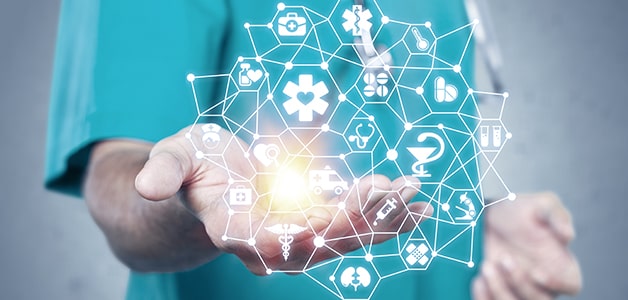-
According to the 2022 Cost of a Data Breach report, the healthcare industry suffered the most from healthcare fraud. The report also stated that the averagWordpresse total cost of data breaches in the healthcare industry is $10.10M. Since 2020, breach cost in the healthcare sector has increased by 42%. Furthermore, the industry also has to deal with emerging challenges like treatment validation, counterfeiting, protective equipment supply, and more. These problems have highlighted the urgent need for a safe healthcare infrastructure around the globe. A blockchain-powered healthcare system can effectively tackle these issues. Blockchain business solutions for healthcare include digital passes, health credential verifications, remote monitoring, and more.
Blockchain Technology in Healthcare Sector
Blockchain can significantly contribute to addressing issues in the healthcare sector. It enables safe permissioned data sharing across numerous stakeholders, enhancing collaboration, and raising transparency. Blockchain technology can be used in the medical sector in multiple ways because it is open and very secure. It will result in drastically lower costs and new methods for patients to obtain treatment. Here are some of the emerging blockchain healthcare solutions: Also, Read: The Prospects of the Healthcare Industry in the Metaverse
Vaccine Passports and Digital Health Passes
Vaccine passports are blockchain-based digital health passports for international travel. It indicates to customs officials that a passenger has received vaccination against diseases like COVID-19. Vaccine passports are benefitting from the development of new, secure electronic credentialing technologies. The use of these passports extends beyond international travel to various contexts. Organizations that require gatherings, for instance, are looking for digital replacements for printed test results and immunization records. In some circumstances, this entails determining if people have had voluntary, privacy-preserving testing or vaccinations. Digital health passes are an easy and optional way for individuals to exchange information about their health. It may include whether they have received a vaccination or have tested negative for COVID-19. Individuals with digital health passes can give a scannable QR code on their mobile phones. Additionally, they can print hard copies of their credential that validates their status without carrying various documents. Also, a digital wallet safely keeps personal information encrypted on the user's phone using blockchain technology. Also, Visit: Increasing Importance of Blockchain for Healthcare Development
Counterfeit Medicine Identification
The prevalence of unlicensed online pharmacies, covert labs, and criminal networks has led to an international problem with counterfeit medications. People can easily identify these medicines due to poor label printing and dubious pricing tags. Yet, it isn't always the case. A major pharmaceutical firm in the US is employing blockchain and AI (Artificial Intelligence) to ensure the accuracy and reliability of its goods. During manufacture, the firm captures a high-resolution digital image for each label. The photograph creates a digital twin of the label by capturing distinctive faults imperceptible to the human eye but detectable by AI. If someone questions the validity of the product, they can use this digital twin via the blockchain. Even if the real-world label is tarnished or damaged, AI can evaluate the digital counterpart with the suspect label. Using blockchain to monitor and trace pharmaceutical items from the manufacturing facility to the patient brings an additional element to the process.
Streamlining Research and Development (R&D) Processes
One of the key areas in healthcare is research and development. R&D investments have increased over the past several years due to the entry of technology firms and healthcare companies. Businesses can use blockchain healthcare solutions to streamline the R&D process and make it more affordable and innovative. Pharma and MedTech firms can use blockchain technology to automatically validate, coordinate, and maintain adherence to trial protocols. When patients or volunteers self-identify and sign up for research trials, blockchain can simplify recruiting processes. It provides an automatic system to evaluate and confirm their eligibility. Researchers' data collection procedures will become simple and error-free with blockchain. The clinical data acquired will be trustworthy and verifiable because blockchain technology can assist in storing all data in a consistent, accessible architecture. Patients can provide access to their public and private keys to others. All of the aforementioned factors can facilitate the quicker and more reasonably priced completion of trials by improved patient recruitment, data sharing across various sites, minimized data preprocessing, and quicker regulatory clearances.
Non-fungible Tokens (NFTs)
If the healthcare sector starts creating NFTs for patients' genetic information, then patients can trace it. As patients are the exclusive owners of their data, as confirmed by the NFT authentication, they will know where it ends up and hold those who accessed it without their consent accountable. Additionally, NFT owners can activate a function to make money each time a transaction using the data takes place. NFTs may hold the key to using and sharing medical data. Additionally, it allows users to keep track of their data and get feedback while preserving their anonymity, giving them authority over their data. Explore: Healthcare Insurance Solutions with Blockchain Smart Contracts
Challenges
Although blockchain technology offers many possibilities for the healthcare industry, it is not yet completely developed and cannot be immediately applied. Before companies implement a healthcare blockchain, they have to solve several technological, organizational, and behavioral economic obstacles. Some of these challenges include:
- Scalability constraints
- Data standardization
- Regulatory considerations
- Operating costs
Also, Read: Blockchain in Healthcare Data Management | Impact, Benefits, and Use Cases
Summing Up
Blockchain technology offers the foundation of development and adaptability. Although the limits of today's technology will apply to its initial application, blockchain's open nature will foster and promote industry-wide development in the future. If you are interested in developing blockchain healthcare solutions, then Oodles is a reliable partner. Our skilled blockchain developers can assist you with the right blockchain solutions to suit your unique requirements. Contact us today to develop cutting-edge applications in healthcare.

Our Offices
INDIA
Emaar Digital Greens, Sector 61,
Gurugram, Haryana
122011.
Welldone Tech Park,
Sector 48, Sohna road,
Gurugram, Haryana
122018.















